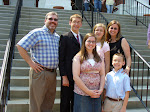
Last night we finished watching Ken Burns's new documentary series called "The War." My fascination with that era of history continues unabated; I could have watched 20 more hours of it. There is so much from that time that is meaningful for me personally, even though I wasn't born until 20 years later (1963).
Generally speaking, I liked this series, though I didn't think it matched his series on "The Civil War." I was regularly moved to tears watching that series, and he seemed to do something there that had never been done. I felt a connection with those people - both North and South - that I had never felt before, and I'm someone who is interested in that era. I felt like there was something magisterial, something masterpiece-like about that series, and as I watched it I harbored doubts that he would ever be able to get out from under the shadow that that presentation would cast over all his future work. His other series - on jazz music and baseball, I think - held no interest for me and I ignored them. However, I wouldn't miss "The War" for anything! (His next series is on the national parks!)
I certainly learned things, and several times I was moved emotionally, but I didn't think the series as a whole matched his work on "The Civil War" or other pieces of work on this time of history, like "World at War," "Band of Brothers," and the like. I don't think I'll buy it, though I'm tempted to look at the book, and I would love the cd of music!
Moving from the documentary series itself to what the series covered, I have several comments.
1. With breath-taking awe, I am still deeply moved by the magnitude of the struggle that was WWII. When we see what was at stake, and how much effort had to be expended, the entire struggle terrifies and inspires me. How did the world get to such a point? Why would men attempt such evil schemes? Why do people cause so much suffering? I look back at the mid-20th century in the same way I look at a rattlesnake at the zoo. I am simultaneously drawn toward it and repelled by it.
2. Because of the magnitude of the struggle, I can begin to understand the profound confidence that post-war generation had. They had faced the greatest evil of all time and had won. What could possibly challenge or threaten them now? I can only imagine the levels of confidence, self-assuredness, and deep appreciation for what is good in a culture. It is dizzying. Massive, national "high-fives" all around!
3. I am staggered by the kinds of loss(es) our culture endured. Five thousand here, 18, 000 there, 4,500 again - these numbers were peppered throughout the series. What must it have been like to lose so many people? And I can't help but contrast these kinds of losses with the meagre losses we have faced so far in Iraq/Afghanistan. Now, of course, I don't mean to minimize any single individual's death in our contemporary conflict, and I know our military families are making great sacrifices; I don't mean to deny any of this. But when you look at what our culture endured - at what the American "body politic" absorbed - I can't help but appreciate more what that generation did, and I can't help but disrespect the hollow, whining voices of protest today. We are at war; men will die; but we must win. Our collective memory is too much of Vietnam and too little of Normandy.
4. Massive evil movements inflict inevitable and irreparable damage on the world; it happened once (actually, many times!) and will happen again. In fact, I think it is happened right now. Certain "things have been set in motion that cannot be undone," I think is how Gandolf put it. When Hitler began to move, and was not stopped, there were certain things that were simply going to have to be done, and I think the same is true today. The march of militant Islam, unchecked by governments and nations, consistent accomodation, temporary peaces - "Peace in our time!" - will demand a definitive rebuttal, culturally, intellectually, and maybe even militarily. Maybe that is why I am so fascinated by the WWII era; it looks so much like our own.
5. I knew about the internment camps for Japanese Americans, but I had minimized their evil, either intentionally or in error. But I could not escape from the shame and embarrassment the discussion of these camps roused; I was grieved. I can understand the motivation that led to these camps, but cannot agree with it. The character of the Japanese American community I saw throughout this whole sordid affair challenged me. Despite being so deeply wronged, many Japanese Americans served so selflessly and fought so bravely. They won my respect.
Well, there is so much more I could say, but this post is already too long. One more thought: I long once again for a strong, robust, confident, morally clear America.






1 comment:
This sounds like an incredible series. I'll have to be sure to pick up the DVD set when it's released.
Post a Comment